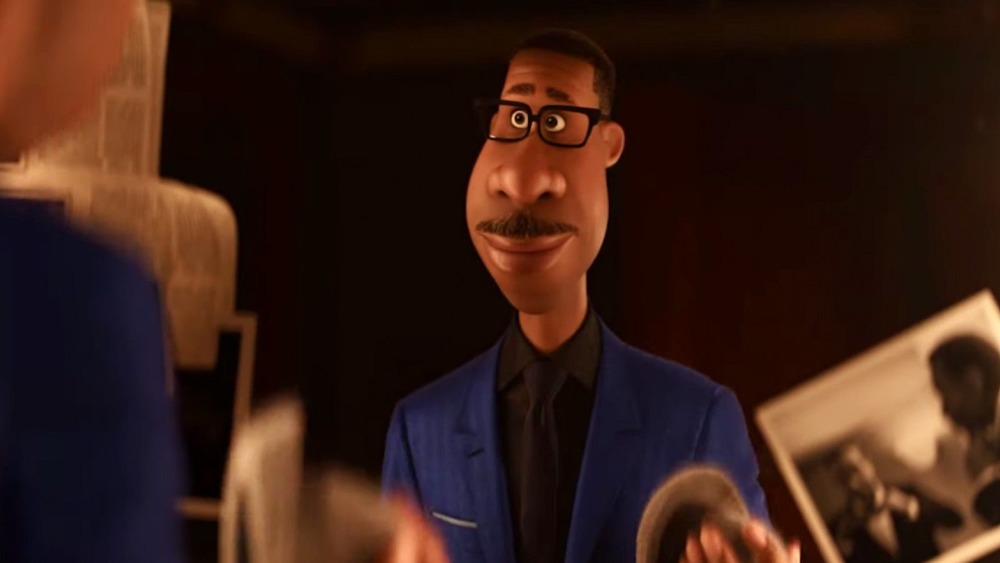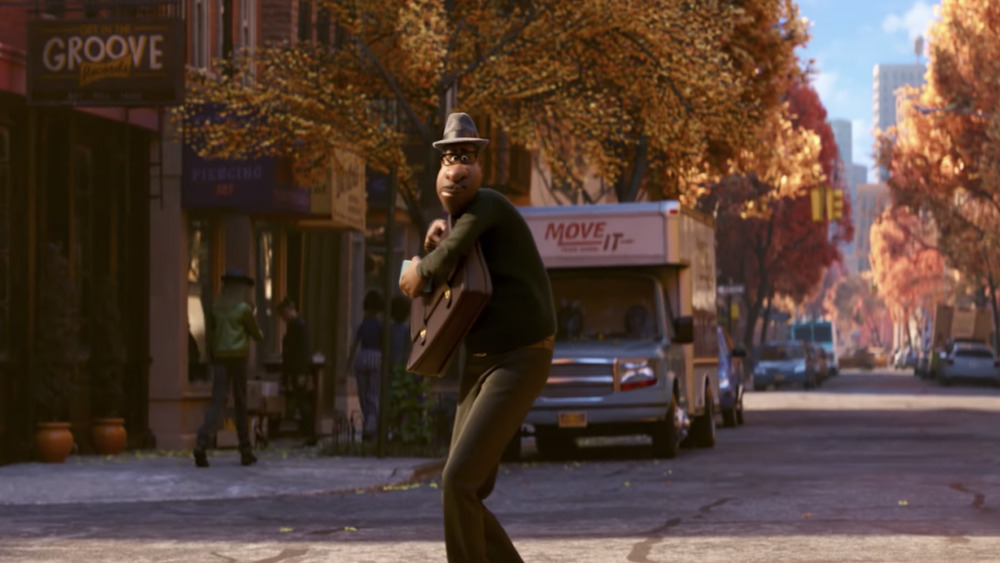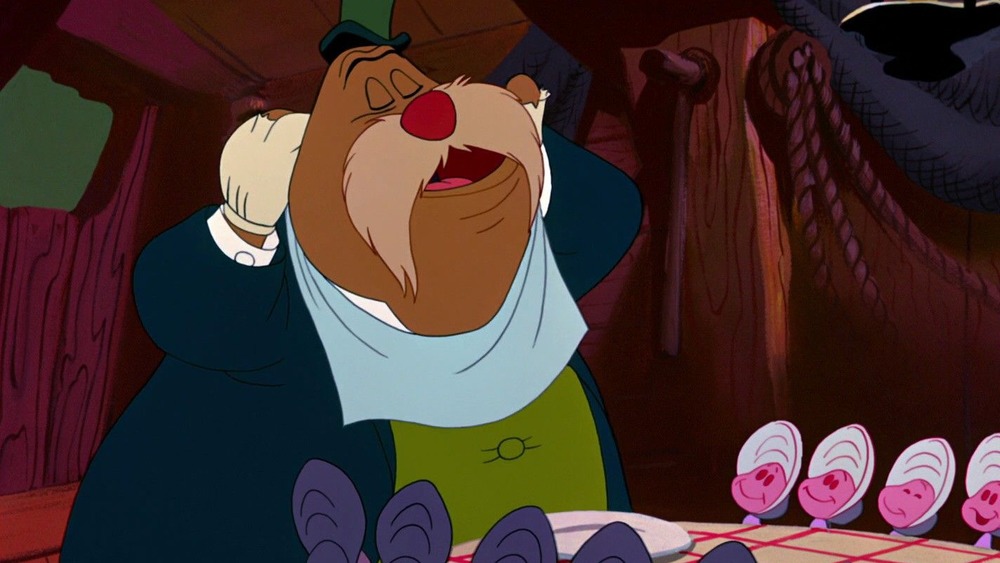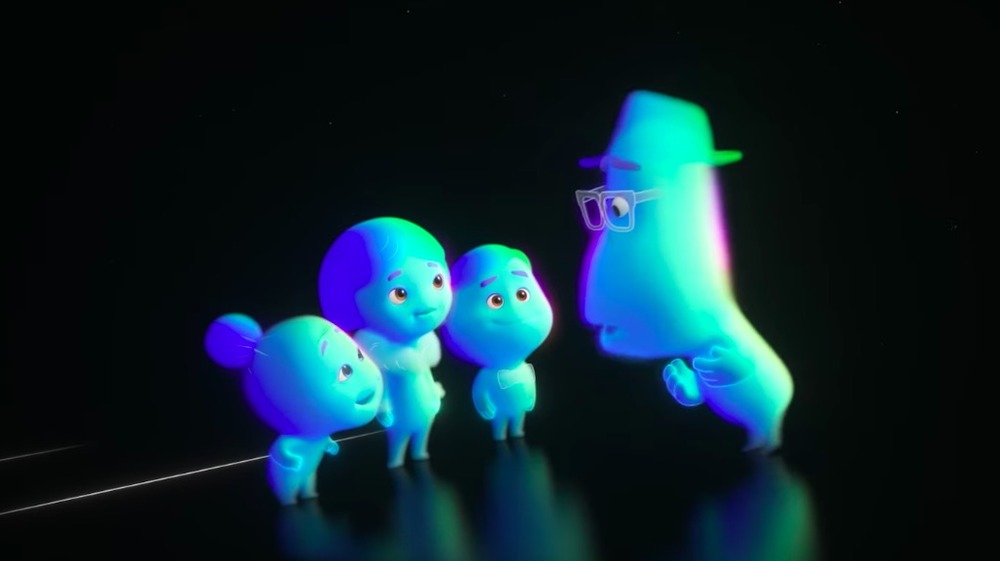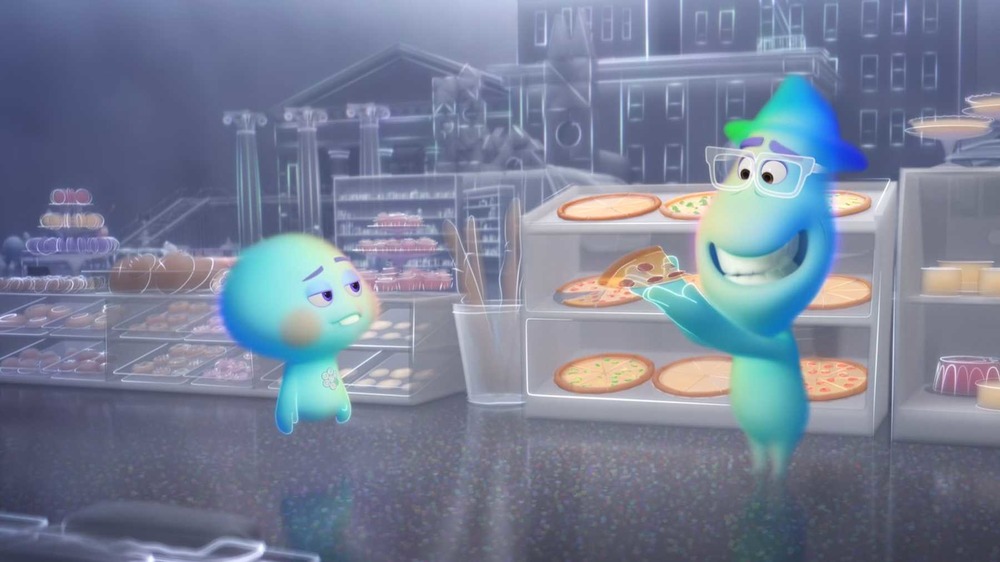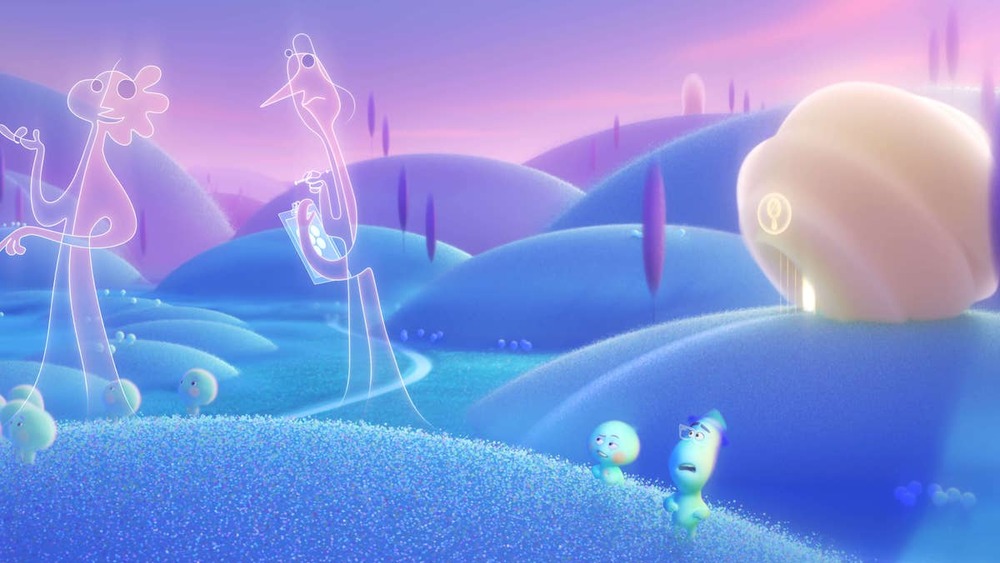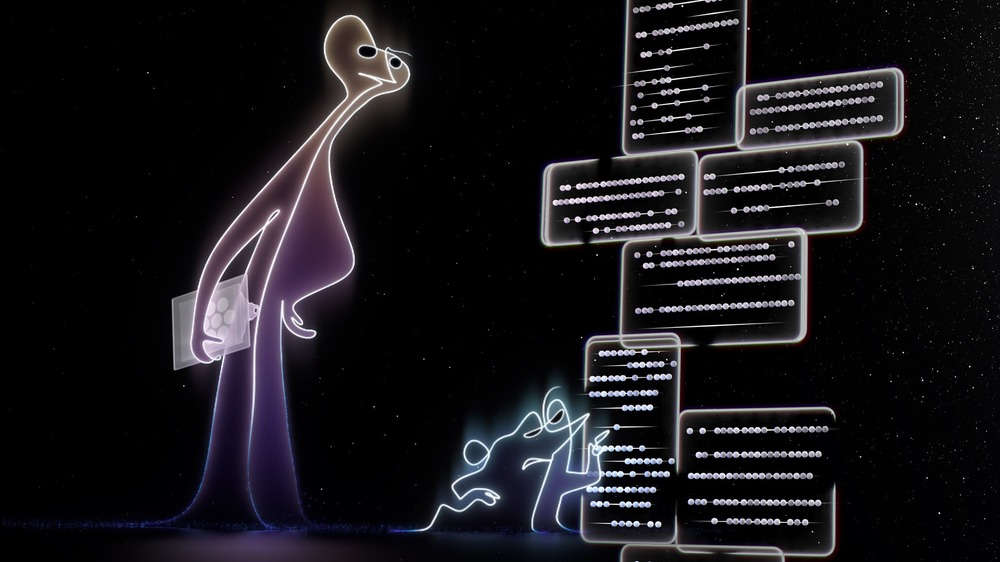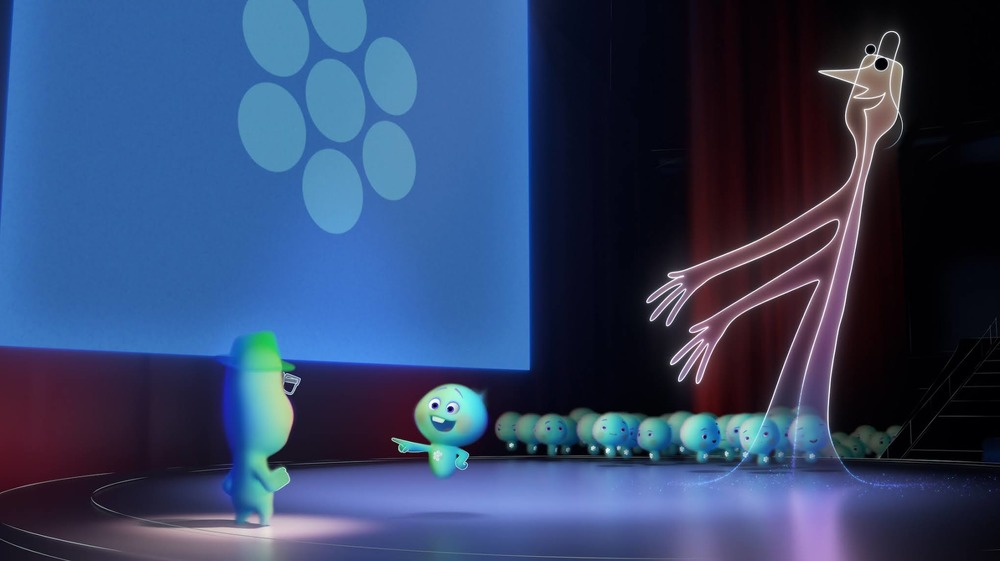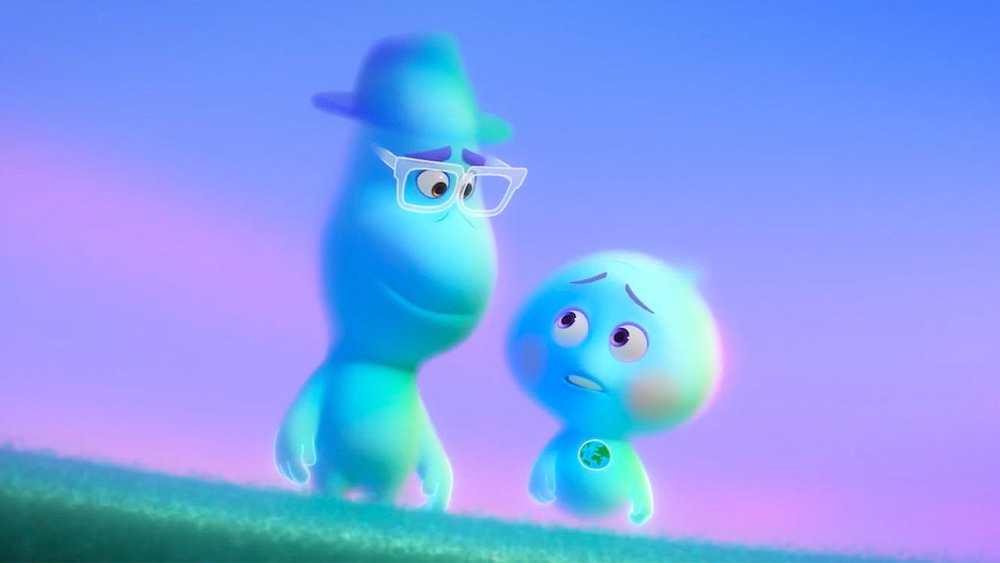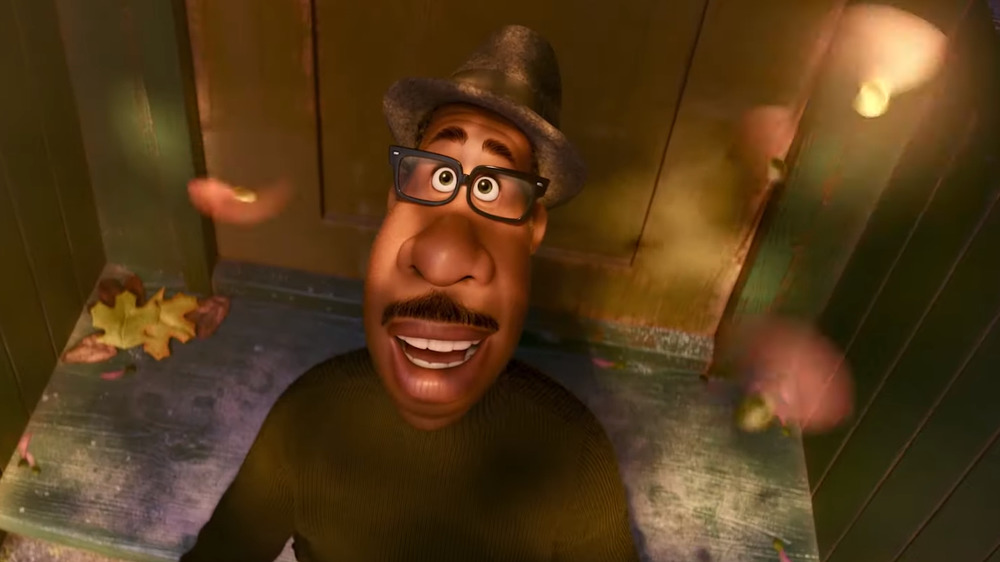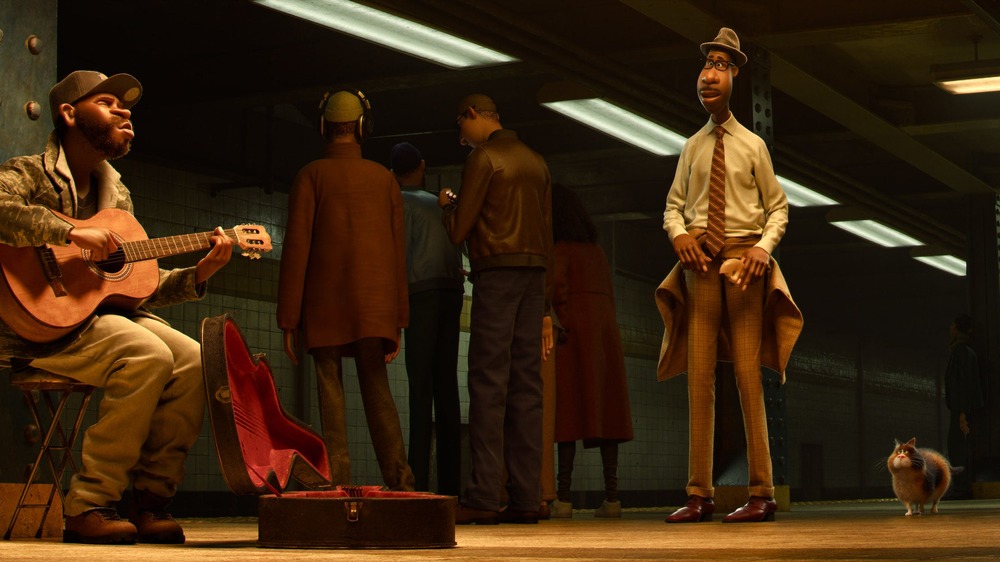Things Only Adults Notice In Soul
With movie theaters in the U.S. still struggling amidst the ongoing coronavirus pandemic, and some studios making the tough decision to bypass theaters entirely for the foreseeable future, Pixar's highly anticipated animated film Soul scrapped plans for its intended theatrical release to debut instead on Disney+ on Christmas Day, 2020, as a holiday gift to the streaming service's subscribers. Like Pixar's previous introspective hit, Inside Out, Soul explores what's going on beneath the surface of human beings, musing on what it means to live, die, and above all, what makes us truly us.
Yet despite its ambitious premise, Soul does a good job in making its complex philosophical questions digestible for a young audience. Kids should have no trouble understanding Soul's broader themes about what makes life worth living. However, there are some subtler details in Soul that will likely go right over young viewers' heads, but will grab the attention of adults. From the mechanics of the afterlife to 22's kleptomaniac tendencies, here are some of the things only adults notice in Soul.
Jimmy Shoes
When we first meet Joe Gardner (voiced by Jamie Foxx) at the beginning of Soul, he's a part-time band director in an inner city middle school who dreams of one day becoming a professional jazz pianist. His dreams seem set to come true when he lands an audition with the Dorothea Williams Quartet, a highly respected jazz group led by professional saxophonist Dorothea Williams (Angela Bassett).
As Joe rushes to his tryout, weaving through the bustling New York City streets, he runs by several local businesses — Lotus Blossom Yoga Studio, a rare and used bookstore — but one sign stands out as obviously nodding to a real-life brand: Jimmy Shoes. Adults will immediately recognize the store name as a reference to Jimmy Choo, a high-end fashion house specializing in luxury shoes and handbags, founded by couture shoe designer Jimmy Choo in 1996. Why Soul decided to include a nod to a real-life company when most of the other products seen in its various ads and the names on its storefronts are either vaguely nondescript or fictional is anybody's guess. But while kids won't think twice about any of the brands that appear in the New York City of Soul, adults may get a chuckle at the one they recognize.
"This beats my dream about the walrus."
After Joe falls into an open manhole and awakens in the afterlife, he finds himself on a slow-moving conveyor belt to the Great Beyond. Uncertain what's just happened, he asks the first group of people he encounters what's going on, and they calmly inform him that he's passed on. As Joe panics, one of the women in the group casually observes that the actual afterlife "beats my dream about the walrus."
It's hard to know for sure what this line is supposed to mean, if anything at all. It could be just a silly one-off line meant to offer viewers a chuckle. But if it is referring to something specific, it could be a nod to Disney's Alice in Wonderland, which features a pretty disturbing song called "The Walrus and the Carpenter." In the song, a scheming walrus and a human carpenter team up to lure a family of child-like oysters away from their mother and into a restaurant, where the walrus then distracts the carpenter so that he can eat them all. The little oysters in Alice in Wonderland do bear somewhat of a resemblance to the unfinished souls in the You Seminar, and for those oysters, the walrus would have been the last thing they saw before they died. Is Soul making a dark reference to a murderous walrus, or a harmless quip about the weirdness of dreams? Kids won't notice or care, but adults may be left wondering.
Something very bad just happened on Earth
When Joe first lands on the conveyor belt meant to transport him to the afterlife, he's all alone. Running away from the bright portal to the Great Beyond, Joe meets a trio of other souls who are all content to move on. But instead of joining them and entering eternity, Joe continues to run down the conveyor belt — and suddenly finds himself in the midst of a dense crowd of hundreds of souls, all being shunted toward that never-ending jazz concert in the stars.
What are we meant to infer by the conveyor belt being essentially empty one minute, and then absolutely packed with people the next? Sure, people may die every second in real life, but in the world of Soul, that doesn't seem to be the case, since Joe and the first group he met had their sections of the conveyor belt all to themselves. The most obvious explanation for the sudden crowd is that something catastrophic happened a few minutes after Joe fell into that manhole, resulting in massive crowds of people all arriving in the afterlife all at once. Kids probably won't question why Joe is suddenly surrounded by souls when there weren't any a moment before, but adults may be a little disturbed by what it implies.
Poor eyesight in the afterlife
It's established early on in Soul that souls have no sense of touch, taste, or any of their other senses. As 22 (Tina Fey) demonstrates to Joe, physical senses don't exist in the afterlife, and any semblance of them is merely an illusion. 22 describes the You Seminar as a "hypothetical," where all the souls can look and sound like anything, and amusingly tells Joe that she chooses to sound like a middle-aged white woman "because it annoys people."
So if everything is an illusion, why do so many of the souls Joe encounters wear glasses? Eyesight itself is one of the senses that shouldn't exist in the You Seminar (which itself begs the question of how Joe is actually experiencing everything he encounters in the afterlife, since apparently it's not through his senses of sight and sound, as it's portrayed). Are Joe's glasses and hat, and the accessories of the other people he encounters, somehow integral to their sense of self? Do they serve some other cosmic purpose? Kids aren't likely to think twice about it, but adults may find themselves preoccupied with wondering why Joe left all of his distinctive features and clothing behind, but brought his glasses with him.
People are born without souls
There are a few lines in Soul that have significant implications for age-old debates back on Earth. Kids may not even notice, but adults are much more likely to realize the potential significance of an exchange where Joe asks Jerry (Alice Braga) if the You Seminar is where personalities come from, and she replies, "Of course. Do you think people are just born with them?"
Following Jerry's line to its natural conclusion, she seems to be implying that people get their souls at some point after they are born. The process, as it's laid out in Soul, seems to be that souls are first created, then given their core personalities via the various pavilions in the You Seminar, and finally find their "spark," or will to live, through their mentorship under other souls who have already lived and died. At the conclusion of this process, the souls make the trek to Earth and, presumably, are assigned to a body. Jerry's line seems to indicate that those bodies already exist, and the souls arrive following birth. Depending on the religious and philosophical beliefs of the adults watching Soul, that small bit of worldbuilding could potentially make or break the movie for some viewers, while others likely won't even notice it at all.
"The count hasn't been off in centuries."
When cosmic accountant Terry (Rachel House) discovers that the count of souls entering the afterlife is off by one, he immediately brings his concerns to Jerry, raising the alarm that the count is off. Jerry, unconcerned, brushes him off by assuming that he must have made a mistake, since the count "hasn't been off in centuries." Reassuring, right?
Wrong, assuming you're an adult with a decent grasp of just how long humans have been walking around planet Earth. While kids may assume that Jerry's line means that the count is always reliable, most adults will quickly realize that "centuries" isn't actually all that long in the grand scheme of things. Depending on when souls started filing into the Great Beyond, we're talking hundreds of thousands, possibly up to millions of years of Terry counting souls. If the count hasn't been off in "centuries," that could mean that a rogue soul has dropped off the celestial grid literally thousands of times before. Kids likely won't do the math necessary to figure this out, but adults may be left wondering what happened to all of those runaway souls, and if they're still roaming about somewhere.
"Most people wish that, 22"
As a soul who has not yet found her "spark," and thus hasn't earned her Earth pass, 22 has managed to remain in the You Seminar for millennia by tormenting her mentors and refusing to cooperate in the process that would finally send her to live as a human on Earth. She's gotten her defiance of the You Seminar system down to an art form, and when she's assigned to Joe (masquerading as a child psychologist we never meet named Björn Börgensson), she has no intention of going along with the system this time. Once Jerry (Richard Ayoade) catches her and passes her to Joe, she gleefully tells him, "I'm gonna make you wish you never died."
Unmoved, Jerry responds, "Most people wish that, 22."
Seems right, until you remember that Jerry is in the unique position to actually know how most souls feel about dying from the perspective of the afterlife. While he works in the You Seminar, Jerry's interactions with Terry make it clear that there's a decent amount of interaction between co-workers in the Great Before and the Great Beyond. Jerry admitting that most people wish they'd never died seems to imply that the Beyond may not be so great after all. If it was amazing, why would most people wish they were still alive? It's a throwaway line with seriously dark implications, and may leave adults wondering what sort of unsavory afterlife awaits the dearly departed in the Pixar universe.
22's former mentors
When we first meet 22, we quickly learn that she has absolutely no intention of ever leaving the You Seminar for a mortal life on Earth. She likes being an incorporeal soul, and sees no reason to trade her eternal freedom for a physical, human existence. The Jerrys have spent centuries upon centuries trying to find her the perfect mentor that will help her find her "spark," but to no avail. 22 ultimately outlasts them all, and in her interactions with Joe, she namedrops several recognizable figures who have tried to inspire her, including Abraham Lincoln, Marie Antoinette, and Albert Einstein.
But when 22 takes Joe through her home on her way to visit the Zone, we see that she's collected all the nametags of her past mentors, and there were a lot more familiar names in there than the ones she explicitly mentioned. Visible in the nametags on 22's wall are tags for Joan of Arc, Nelson Mandela, Harvey Milk, George Orwell, Aretha Franklin, Amelia Earhart, Marvin Gaye, Martin Luther King, Jr., Jack Kirby, Johnny Cash, Pablo Picasso, Babe Ruth, Harriet Tubman, and a host of other significant figures from human history. It's a brief scene, and kids aren't likely to recognize many of the names, but adults may smile at the impressive Who's Who of mentors 22 has managed to completely burn out.
"I've been messing with this team for decades."
Once 22 has agreed to Joe's plan for her to earn her Earth pass, then give it to him, the two embark on a tour of the You Seminar, searching for 22's spark. Unfortunately, since finding a spark is easier said than done, 22 takes him to the Zone, the place that exists between the physical and spiritual. This, she explains, is where living humans go when they're so deeply into their activities that they literally transcend to a different plane. Joe recalls that he was in the Zone earlier that same day, right before he fell into the manhole, when he was auditioning for Dorothea Williams.
But when Joe assumes it's just musicians who get to enter the Zone, 22 quickly points out that anyone can enter under the right circumstances, including actors, tattoo artists, and basketball players. 22 enjoys disturbing people in the Zone, and takes particular pleasure in thwarting a basketball player right before he makes a basket, telling Joe, "I have been messing with this team for decades."
That team is the New York Knicks, as evidenced by a team logo that can be briefly glimpsed when the scene cuts to the player missing the basket in real time. Most kids probably won't make the connection to the NBA team's infamous losing streak, but adults will likely get a chuckle out of the implication that 22 has been the source of long-suffering Knicks fans' seemingly interminable woes.
Joe probably has significant brain injuries
Soul boils down Joe's journey to the afterlife and back to little more than a matter of getting his soul reunited with his body, as if it was knocked loose by his tumble into the manhole and just needs to be superglued back in place. Sure enough, once Joe finds his comatose body in the hospital, all it takes is 22 diving inside for him to be back on his feet, good as new. Although it still takes a good amount of effort for Joe to get the Jerrys and Terrys to agree to let his soul stay in his body, the body itself seems pretty much no worse for wear.
While kids may accept this premise at face value, adults will likely be left wondering just how Joe is up and walking around by the end as if nothing happened, considering that his injury was severe enough to not only place him in a coma, but also jettison his soul to the afterlife. Joe's presence in the Great Beyond seems to imply that he was functionally dead, indicating at the very least some sort of traumatic brain injury. It's great that Joe gets a second chance by the end of the film, but adults may still feel a little nervous about Joe's overall health, and wonder if the major trauma sustained in his fall could have significant repercussions for his long-term well-being.
22 is stealing at least some of that food
Upon breaking out of the hospital in Joe's body, 22 is understandably overwhelmed by the bustling streets of New York City, and winds up huddling in a corner, terrified. Joe (in the body of a cat) lures her out with a slice of pepperoni pizza, igniting 22's previously undiscovered love of food. For the rest of the film, 22-as-Joe is rarely seen without some sort of snack in her hand, whether it's a piece of pizza, a gyro, a bagel, or — disgustingly — a half-consumed slushie she found underneath a seat on the subway.
Yet one thing we never see 22-as-Joe doing is actually paying for any of this food. While it's possible that she's using Joe's phone to pay for some of it, it seems more probable, given 22's complete indifference to Earthly customs, that she's just swiping whatever looks good to her. She seems to have no concept of money (she gives a street musician a half-eaten bagel as a tip), and is governed almost entirely by her id. It would almost be more out of character if she was stopping to pay. Kids probably aren't used to thinking about how people pay for the things that they want, but adults know all too well that nothing is free — especially in New York City — no matter how good it smells.
